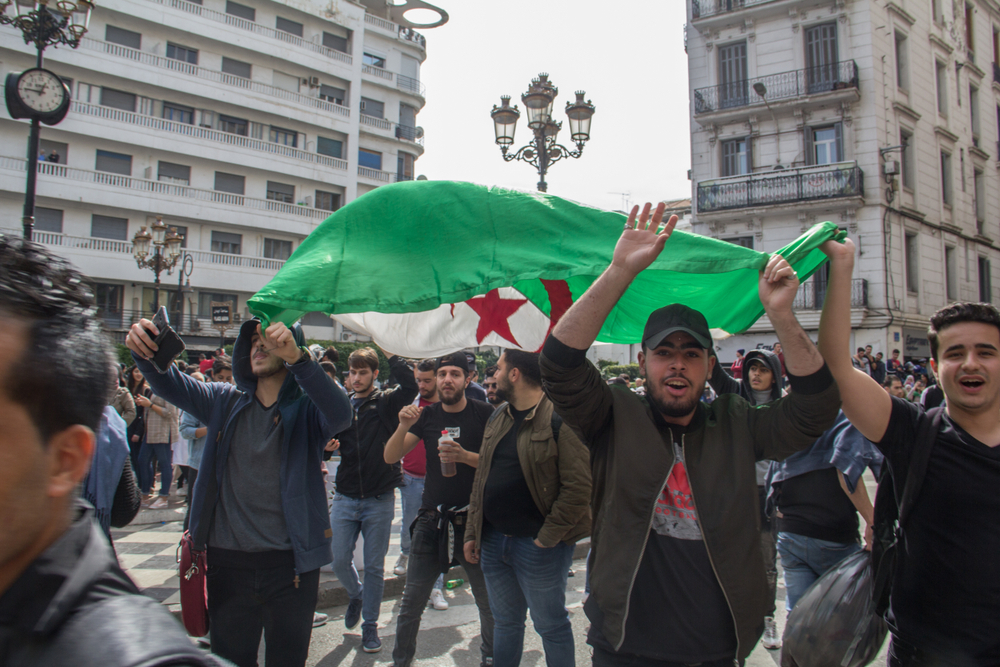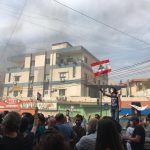by Theodore Karasik and Giorgio Cafiero
Public protests in Algeria are rare. Yet since February 22, demonstrations across Algiers, Annaba, Blida, Constantine, and Oran have revealed sources of instability unique to Algeria. The protestors, who come from diverse backgrounds, are unified in their stance that Algeria’s head of state, Abdelaziz Bouteflika, who was elected president in 1999, must step down. Yet their struggle is not against Bouteflika as an individual leader per se. Rather, they are standing up to a “deep state” made up of members of Algeria’s military, security apparatus, and business elite, known as the pouvoir, the “power,” who want Bouteflika to remain at the helm to protect their privileges as the country transitions to a new president, whoever that will be.
Although the Arab Spring uprisings dethroned three North African strongmen—Libya’s Muammar Gaddafi, Tunisia’s Zine El Abidine Ben Ali, and Egypt’s Hosni Mubarak—Algeria’s leadership weathered the regional storm. Since 2011, many analysts have attributed Algeria’s relatively quiet experience to a host of complicated factors unique to the Maghrebi country. Yet most assessments of the Algerian government’s success in protecting the country from the winds of change credit the public’s attitudes about politics.
Algeria’s “black decade” experience of the 1990s, when a radical Islamist insurgency and a state crackdown resulted in over 200,000 deaths and a period of isolation, heavily informs these attitudes. By 2011, most Algerians were quite tolerant of an authoritarian political structure that suppressed dissent so long as the country remained relatively stable. From 2011 to 2013, many Algerians concluded from the violence plaguing Egypt, Libya, Mali, Syria, Yemen, and other Arab/Muslim states that challenging the status quo only risked a return to widespread unrest and Islamist terrorism.
Fast forward to February/March 2019. The environment in Algeria has changed. Younger Algerians leading today’s protests are far less willing to embrace this political-acquiescence-for-peace bargain. With almost 70 percent of Algerians below the age of 30, a large percentage of the population did not experience the struggle for independence in the 1950s and 1960s or the violence of the 1990s. These younger Algerians are protesting for a new generation of Algerians to take the helm. In contrast to their parents and grandparents, younger citizens feel far less indebted to the old guard of the ruling National Liberation Front. They are much angrier about rampant corruption, low quality public services, and youth unemployment.
Although the frustration felt by Algeria’s protestors has been building up steadily since Bouteflika’s stroke in 2013 and his disappearance from the public eye, the Algerian president’s formal submission of his candidacy for a fifth term triggered the ongoing demonstrations. Since February 24, he has been undergoing “routine medical tests” in Switzerland, contributing to the growing perception that he is entirely unfit to lead the country. In response to the protests across Algeria’s cities and towns, Bouteflika pledged not to serve a full term if he wins the election next month. After acknowledging the protests, he declared, “I listened and heard the cry from the hearts of protesters and in particular the thousands of young people who questioned me about the future of our homeland.” Yet such words have done nothing to end the demonstrators’ calls for him to relinquish power immediately.
But there’s a difference between the Arab Spring revolts and the potential for an “Arab Spring 2.0” in Algeria. Tens of thousands of citizens protesting in public is an extremely significant situation for Algeria, and the past three weeks of demonstrations highlight the extent to which the government faces a major challenge. Yet such protests are not necessarily a signal that the government is on the verge of falling from power like other Arab Spring states. The ruling clique around Bouteflika still maintains the Algerian military’s loyalty. It can also still count on allies abroad, particularly in the West, and Russia too.
Algeria’s leadership clearly did not anticipate the eruption of these protests. Now officials in Algiers are moving to a “plan B” for the post-Bouteflika period by trying to find a viable strategy for maintaining stability in the country before the public demonstrations escalate. A worst-case scenario whereby Algeria returns to a state of civil war continues to weigh heavily on the minds of many citizens, particularly those Algerians old enough to recall the episodes of violence that followed the military takeover of 1992. But Algeria’s ailing head of state no longer enjoys legitimacy among the public solely for claiming to restore relative peace and stability to the North African country several years after taking power in 1999. The leeway that Algeria’s citizens once granted him is clearly diminished.
Perhaps the government will put forward another presidential candidate while also pledging to make specific reforms that address the sources of anger among Algeria’s younger citizens. The perception that a “deep state” governs Algeria with Bouteflika as a puppet has brought many to the streets since last month. That rage won’t diminish if another candidate runs instead of the president with support from the ruling clique.
The government might also decide to crack down on peaceful demonstrators in an effort to intimidate citizens into returning home and stop calling for Bouteflika’s resignation. In this scenario, a key factor would be the reaction of Algeria’s opposition figures and the country’s Islamists, whether they would side with the younger citizens on the street.
For now, General Ahmed Gaid Salah, a Bouteflika loyalist who heads Algeria’s army, is warning the country about “parties who wish to bring Algeria back to the years of violence.” But this implied threat may do little to silence Algerians (especially the youth) grappling with an economy that may be on the verge of collapse. Bouteflika’s presidency is facing the gravest challenge to its legitimacy since it began in 1999, and Algeria’s “deep state” may be seeing its first serious cracks.
Theodore Karasik (@TKarasik) is an advisor at Gulf State Analytics (@GulfStateAnalyt), a Washington, DC-based geopolitical risk consultancy.






However, a big party to the deep state, Ex. colonialist France is missed in the analysis which is in favor of keeping the current system in place.
The people of Algeria have spoken. They’re saying ENOUGH to their corrupt Government, to those THIEVES, to those CRIMINALS.They’re also saying ENOUGH to the west. Enough lying to us, trying to teach us DEMOCRACY and in the same time working with those corrupt autocrats and even more, covering up and protecting them and plus, they are the ones against DEMOCRACY , the people who wants it so bad. WASHINGTON: Your policy in the Arab world has failed! It is time for you to reconsider your ties to those corrupt governments and work more on your ties with the people. ” The people of the Arab world are saying : YES and YES for Democracy. You cannot teach me something but you are the one staying in my way to have it.”. The state is made of three elements ( Government – territory – people). You cannot make policies by excluding the PEOPLE who are the most important asset inside the nation. Stop making policies based on Governments and territories ONLY, it doesn’t work that way. That’s why your policy towards the Arab world has failed. This message is for Washington Policy-makers with a true American Values that I personally cherish. PEACE
Just a month ago, the algerian society was living in a state of unconscience, state of poorness , mesury and discontent toward the gouvernement. One month ago , thousands of illegal immigration boats were going from our beaches leaving the algerian mother who farwelles the apple her eye agonized ,that son who just went looking for Life and nothing else , the algerian citizen wasn’t looking for luxyry and wealth, he was just fetching for a place where he can be a descent human. One week ago, the 22 of february our mother Algeria called us for succour. May be at first many didn’t answer the call because a manifestation to them means blood and death, means reliving the black decade, everyone was terrified about what can happen in that day .Friday, the twenty second of february 2019 , young people went out in the streets, millions of them participated in those pacific beautiful protestations that reflect the awarness of the algerian Citizen .millions of boys and girls, growns and children even famillies were out to kick that corrupted system out which is eating away the body of our beloved country . A scream of an an algerian who wishes nothing but living with dignity in his country, a scream of a young boy who wants to be hired beacuse of his competnece not bribery, a call of a mother who wishes seeing her kid building a life in his country .all this only shows that the awarness of algerian people have exceeded all expectations .